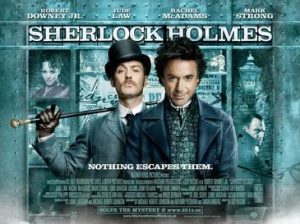
(Judge Dredd Megazine, Rebellion)
Sherlock Holmes, like Dracula and Tarzan, is a pop-culture universe unto himself, but he may not last forever. The last Holmes films I remember in cinemas were Disney’s cartoon Basil the Great Mouse Detective, with Vincent Price as a great rat-Moriarty, and the comedy Without a Clue, where Watson was the detective with a cretinous “Holmes” (Michael Caine) for PR reasons. It’s heartening, then, that Guy Ritchie’s Sherlock Holmes has caused such immense media interest – partly because of the infamous Mr Ritchie, and also because of the star presences of Robert Downey Jr (as Holmes) and Jude Law (as Watson), but also because of the continuing strength and suppleness of the Holmes brand. And Ritchie, quite honestly, has done Sherlock proud.
The mystery may not be the detective’s greatest case, the action-movie grandstanding may be overblown in places, but this film is fun, and surprisingly respectful of Holmes’s legacy. A Ripper-style aristo (Mark Strong), is publicly hanged, but mysteriously returns from the grave with dreams of an eternal British Empire. There’s fighting amid the monuments to Victoriana – the last battle takes place on a half-built Tower Bridge – plus occult secret societies, steampunk science, and a slaughterhouse scene involving buzz-saws and shades of (appropriately) Saw. It’s all diverting, but not what the film’s about; it’s about giving Holmes a fresh look and a fortified right hook, while paying respects to the literary sleuth who found religion in roses and fetishised the mind.
Like JJ Abrams with Star Trek, Ritchie focuses squarely on the relationship between the male leads, with an exasperated Watson preparing to marry and quit Baker Street for good. Watson and Holmes are well-matched sparring partners – no bungler, Watson has picked up many of Holmes’s methods. while being more practical in a pinch. Their breakup is fondly portrayed as the dissolution of a married couple, with Watson trying to protect her nice-girl fiancée (Kelly Reilly) from Holmes’s jealousy, while Holmes contends with femme fatale crime-queen Irene Adler (Rachel McAdams).
But it’s Holmes and Watson as the true couple, virile, pugilistic, and broadly believable. A bored Holmes engages a bout of underground bare-knuckle boxing, demolishing his opponent; yet when an angry Watson later punches him in the mouth, Holmes plainly wouldn’t contemplate hitting back. Leathery and hooded-looking even in broad daylight, Downey doesn’t resemble Holmes, but he has the presence, the obsession, the alieness. He dons fake noses, crashes through privy ceilings, and hires a gipsy palm-reader to warn Watson off marriage, but it’s done in good humour by a director smart enough to know this legend’s bigger than him. Not for the first time, perhaps.
(I reviewed the sequel, Sherlock Holmes: A Game of Shadows, in a later issue of Judge Dredd Megazine.)
Moriarty is the saving grace of Sherlock Holmes: A Game of Shadows, which reunites Guy Ritchie, Jude Law and Robert Downey Jr at Baker Street. Only not really; A Game of Shadows has Holmes (Downey) going Bond, trotting about Europe, hunting bombs in Paris opera houses and caught in pulverising artillery fire in Germany. The grizzled, courteous Professor Moriarty, excellently played by Mad Men’s Jade Harris, aims to start World War I a couple of decades early. He shows he’s serious by bumping off a famous Holmes character at the start, before setting his sights on the just-married Watson (Law).
The new Holmes ramps up the comedy, with a Sherlock so manic that even the script calls him psychotic, and noisy Holmes/Watson banter that loses the married-couple charm of the first film and becomes wearying in seconds. And then – ta-dah! – Stephen Fry lumbers on as Holmes’s brother; his nude scene is especially memorable. The “case,” even for viewers who only half-follow the details, is farcically silly; even sillier is the swing into hardboiled torture as Moriarty gets his claws into Sherlock (though the torture scene itself is genuinely effective).
There’s a pleasantly steampunk air, especially round the scenes in Moriarty’s arms factory base, and a frisson for Holmes fans when we reach Switzerland and see – what else? – a massive icy waterfall. But for all the fan-pleasing nods to Holmes author Arthur Conan Doyle, from the presence of Moriarty’s book The Dynamics of an Asteroid (there’s a Ritchie-Holmes film plot right there), to an ending where Law declaims some of Doyle’s most famous lines, A Game of Shadows simply doesn’t feel like Holmes any more. (Certainly it feels far less faithful now than the TV Sherlock with Benedict Cumberbatch and Martin Freeman, which updates Holmes and Watson to the present).
The exceptions are the crackling scenes between Holmes and Moriarty, lashing out at each other with their entwined intellects. It’s a shame, though, that the writers don’t steal the best taunt that was ever delivered by Holmes to the Prof. It’s not from Doyle’s stories, but from the 1939 film The Adventures of Sherlock Holmes, with Basil Rathbone as Holmes and George Zucco as Moriarty. “You’ve a magnificent brain, Moriarty,” Holmes tells his foe calmly. “I admire it. I admire it so much I’d like to present it pickled in alcohol to the London Medical Society.”
(c) 2018 Rebellion A/S. Reprinted with permission.
[amazon_link asins=’B00FFINOQO’ template=’ProductAd’ store=’anime04c-21′ marketplace=’UK’ link_id=’f1f00200-d8e3-4f04-aa3f-58dc89c97e0a’]
